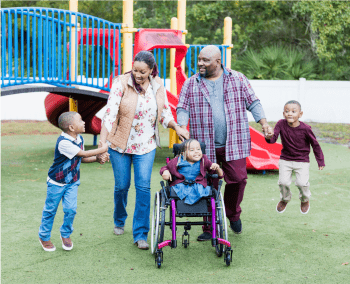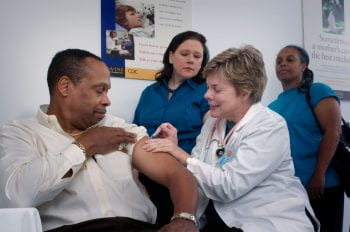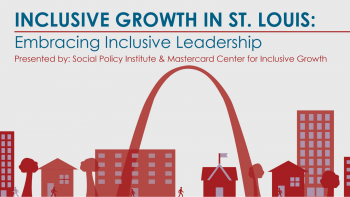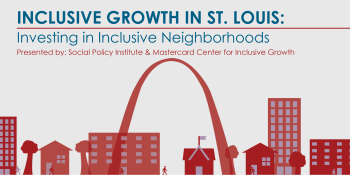What is the role of data in improving impact? And why is this a matter of equity? St. Louis social sector leaders addressed these questions in a panel discussion at STL DataFest 2024 titled Power in Numbers: How Data for Social Impact Cultivates Inclusive Growth on Friday, May 17. The panel was moderated by Simon Huang, Chief Technology Officer for […]
Author: Social Policy Institute
Expanded Child Tax Credit Payments Supported Families Raising Children with Disabilities

Summary The 2021 expanded Child Tax Credit (CTC) provided temporary enhancements to the existing CTC for the tax years 2021 and 2022. Under the expanded credit, families with children under the age of 18 were eligible to receive a credit of up to $3,000 per child ($3,600 for children under the age of 6). In […]
Data for Social Impact Summit [Five Key Takeaways]
In November 2022, the Social Policy Institute at Washington University in St. Louis hosted Data is for Everyone: A Data for Social Impact Summit. The summit’s goal was to build connection and capacity among social sector organizations to cultivate equitable, community-centered data practices. The event featured 21 local and national speakers across five panels. Each […]
Financial Well-being of Frontline Healthcare Workers: The Importance of Employer Benefits

Summary Frontline healthcare workers – especially direct care workers (DCWs), such as home health aides, struggle due to low pay, lack of benefits, and difficult working conditions. The need for these workers is growing. Unless frontline healthcare jobs improve, positions may be difficult to fill, and care for vulnerable members of society may be compromised. […]
Male Caregivers and Engagement in a Family Strengthening Program for Child Disruptive Behavior Disorders

Abstract Awareness and interest in involving male caregivers in child mental health treatment has grown, especially for youth with disruptive behavior disorders like oppositional defiant disorder (ODD). The purpose of this study was to examine the relationship between male caregiver involvement and treatment engagement for child ODD. Children (n = 122) ages 7–11 and their caregivers participated […]
Prevalence of Long-COVID Among Low-Income and Marginalized Groups: Evidence From Israel

Abstract Objective: To identify the socioeconomic and demographic factors associated with the prevalence of self-reported long-COVID symptoms. Method: We examined the association between acute-COVID (SARS-CoV-2) and long-COVID symptoms, by a cross-sectional analysis of data obtained on a prospective online-survey, conducted from November to December 2021 on a nationally-representative sample of the Israeli population (N = 2,246). Results: Findings […]
Predictors of and Barriers to Receipt of Advance Premium Tax Credits

Abstract Objectives: The Advance Premium Tax Credit (APTC) is designed to remedy lack of health insurance due to cost; however, approximately 30 million Americans remain without health insurance, and millions of households leave billions in tax credits unclaimed each year. A prerequisite of APTC is to file one’s taxes; however, few studies have examined tax filing […]
All over the Map: A Systematic Literature Review and State Policy Scan of Medicaid Buy-In Programs for Working Individuals with Disabilities

Abstract While supports for people with disabilities have increased, significant healthcare and financial barriers persist. State-administered Medicaid Buy-In programs for working people with disabilities, distinct from broader buy-in discussions that have emerged as some states consider expanding access to health insurance, are intended to incentivize employment and protect against a loss of Long-Term Services and […]
How Would Americans Respond to Direct Cash Transfers? Results from Two Survey Experiments

Abstract Universal basic income has gained renewed interest among policymakers and researchers in the U.S. While research indicates that unconditional cash transfers produce diverse benefits for households, public support lags in part due to the predicted unemployment and frivolous spending. To understand how Americans would reorganize their lives around unconditional cash transfers, this paper examines […]
Democratizing the economy or introducing economic risk? Gig work during the COVID-19 pandemic

Summary Though the growth of the gig economy has coincided with increased economic precarity in the new economy, we know less about the extent to which gig work (compared with other self-employment arrangements and non-gig work) may fuel economic insecurity among American households. We fill this gap in the literature drawing on a sample of […]
Combatting Rising Healthcare Costs for Healthier Adults

Summary In 2020, healthcare expenditures averaged $12,530 per person, up 9.7% from 2019. In 2018, 19% of U.S. households had medical debt with $2,000 being the median amount owed. Over half of adults between 18 to 64 years of age are estimated to experience some form of medical financial hardship including medical bills or debt, […]
Improving perinatal outcomes for mother and child through Fresh Rx: Nourishing Health Starts
Dan Ferris, associate director of education and training for SPI, along with co-authors, recently published, “Does a food insecurity intervention improve perinatal outcomes for mother and child? A randomized control study protocol of the Fresh Rx: Nourishing Healthy Starts program,” in the Journal of Public Health Research.
Tighter school security leads to lower test scores, study finds (Links to an external site)
As schools around the country have ramped up security efforts in response to recent school shootings, a new study from the Brown School at Washington University in St. Louis suggests that increased surveillance is having a detrimental impact on academic performance.
Lessons from a global team
I truly believe we can accomplish more by stepping outside of our own culture and seek to understand and learn from each other. This is what makes SPI’s global approach to its work so impactful. I look forward to hosting WashU colleagues in Israel next time.
Financial Hardship Increases During Ramadan in Israel
Oren Heller, Postdoctoral Research Associate, and Daniel Yeshua, Program Manager Financial hardship among the Muslim Arab community in Israel increases during Ramadan, a survey from the Social Policy Institute at Washington University in St. Louis finds. This study, the first to examine the economic impact of Ramadan on the Muslim Arab population, can provide insight […]
Let the Child Tax Credit work (Links to an external site)

Brookings shares research on the significant, lifelong effects and benefits programs like 2021’s Child Tax Credit have on children being raised in poverty and why the argument for declining labor force participation with an expanded CTC is weak.
Does a food insecurity intervention improve perinatal outcomes for mother and child? A randomized control study protocol of the Fresh Rx: Nourishing Healthy Starts program

Abstract Pregnancy and postpartum periods represent critical times to support nutrition and household food security, especially for families with limited or strained economic resources. The Fresh Rx: Nourishing Healthy Starts study uses a randomized design to examine a comprehensive, holistic “food is medicine” program targeting food insecure expectant mothers in an area with high rates […]
W.T. Grant Foundation awards $512k to study impact of Choice Neighborhood Initiative
Press release: June 8, 2022 Jason Jabbari, research assistant professor with the Social Policy Institute at Washington University in St. Louis, received a $512k grant from The William T. Grant Foundation to understand if and how the Choice Neighborhood Initiative (CNI) reduces racial inequalities in academic outcomes for children and youth. Alongside Jabbari, co-principal investigators […]
People to Practice to Policy The Social Policy Institute at WashU (May 17) (Links to an external site)

On May 17 we’ll investigate how policy that starts with people and is grounded in evidence can transform the lives of individuals locally, nationally and globally.
Nothing to show for it: Distress among non-degree earners with debt
Press release: May 11, 2022 According to a study by the Social Policy Institute at Washington University in St. Louis, the convergence of college non-completion and student debt among borrowers lead to higher rates of material hardship, healthcare hardship, and financial difficulties than those with a high school degree, those with a college degree, and […]
Expanded Child Tax Credit payments have not reduced employment
Approximately 60 million American children living in 35 million households received monthly payments from the federal government as part of the temporary Child Tax Credit (CTC) expansion. Discourse over whether or not the expanded CTC caused parents to leave the workforce emerged during the period of the expanded credit. On one side, a large number […]
Introducing new associate directors
Friends of SPI, I am delighted to announce three new Social Policy Institute associate directors! SPI has grown significantly since its launch in 2019 and our new associate directors will ensure we continue to generate important evidence and policy-passionate leaders needed to inform equitable policies and inclusive communities. I hope you will join me in […]
New Year greetings from the director

Thank you for being a valued member of the Social Policy Institute community this past year. I am extremely proud of our team—staff, faculty affiliates, funders and community partners—who work so hard to make the world more equitable for everyone. Our mission to make the world more equitable by applying innovative, evidence-based solutions to complex social problems […]
Celebrating the Inclusive Growth in St. Louis Advisory Committee
After an incredible 18-month engagement and 6-part event series, the Social Policy Institute and the Mastercard Center for Inclusive Growth honored the Inclusive Growth in St. Louis advisory committee on Dec. 7, 2021, at Justine Petersen’s Greencubator.
Financial Shocks and Financial Well-Being: What Builds Resiliency in Lower-Income Households?
Households in the U.S. regularly experience unexpected negative income or expense shocks, and low- and moderate-income households experience these shocks at disproportionately high rates. Relatively little is known about the impact these shocks have on households’ subjective sense of financial well-being, and how access to different types of liquidity (e.g., liquid assets, credit cards, social […]
Did government benefits help Israeli households avoid hardship during COVID-19? Evidence from a national survey
At the outset of the COVID-19 pandemic, the government of Israel quickly introduced aggressive social distancing measures to curb the virus spread and adapted its unemployment insurance program in response to rising unemployment rates. This study examines the relationship between household income and the experience of material hardship during the COVID-19 pandemic in Israel and […]
Pandemic isolation increasing negative behaviors among children in Israel
Isolation as a result of COVID-19 exposure is a key public health protocol to mitigate the spread of the virus; however, new survey results indicate increased isolations are associated with anger, violence, difficulties sleeping, and prolonged screen time.
15 Actionable Strategies to Embrace Inclusive Leadership
Speakers at the Inclusive Growth in St. Louis event series on Sept. 23 identified 15 strategies to proactively support and amplify diverse voices and perspectives as discussed by the speakers at the event.
Employment, Financial and Well-being Effects of the 2021 Expanded Child Tax Credit: Wave 1 Executive Summary
The 2021 temporary expansion of the Child Tax Credit (CTC) is unprecedented in its reach and is predicted to cut American child poverty by more than half. The expanded CTC provides families with $3,600 for every child in the household under the age of six and $3,000 for every child between the ages of six […]
Use of Public Benefits Over the First Year of Pandemic
In response to the economic crisis caused by the COVID-19 pandemic, the U.S. federal government enacted initiatives designed to help households weather the pandemic’s effects. These initiatives included expansions of existing programs, such as unemployment insurance, as well as new programs like the economic impact payments. In this brief, we investigate the extent to which […]
Impact of COVID-19 on Households with Children
The COVID-19 pandemic caused major disruptions in employment, child care and education. As a result, both parents and children experienced a variety of hardships in their work and education. While these hardships had reverberating effects throughout households, they were not equally distributed across families with children. In this brief, we explore the effects of COVID-19 […]
Employment Changes During COVID-19
Early in the COVID-19 pandemic, U.S. unemployment peaked at 14.4%. While some workers have returned to payrolls, others have been left behind. This brief examines the nuances of employment changes over the course of the pandemic and the impact of those changes on household financial well-being. Our study finds that the proportion of employees who […]
Housing Hardships During COVID-19
Even prior to the COVID-19 pandemic, U.S. households were burdened by the cost of rental and mortgage payments, burdens which disproportionately fell on Black and Hispanic families. Using a 5-wave survey, we examined whether disparities in housing cost burden continued throughout the pandemic and trends in how households fell behind on rent and mortgage payments. […]
State-by-state: How are families in the U.S. using their Child Tax Credit payments?
The temporary expansion of the Child Tax Credit (CTC) is projected to cut American child poverty by more than half. The CTC expansion provides families with $3,600 for every child in the household under the age of six and $3,000 for every child between the ages of six and 17. The vast majority of U.S. […]
How are families in the U.S. using their Child Tax Credit payments? A 50 state analysis
The temporary expansion of the Child Tax Credit (CTC) is projected to cut American child poverty by more than half. The CTC expansion provides families with $3,600 for every child in the household under the age of six and $3,000 for every child between the ages of six and 17. The vast majority of U.S. […]
New longitudinal Socioeconomic Impacts of COVID-19 Survey calls for sustained public benefit support
The Social Policy Institute at Washington University in St. Louis (SPI) released new findings on the impact of COVID-19 on housing hardship, the importance of employment and associated benefits, such as the Payment Protection Program, family hardships, and efficiency of public benefits designed to support households in need, such as SNAP, TANF, and unemployment insurance benefits.
Embracing Inclusive Leadership

Join us at 12:30 p.m. CT on Thursday, Sept. 23 for an event discussing strategies to create inclusive leadership.
The Socioeconomic Impacts of COVID-19 Study: Survey Methodology Report
When COVID-19 was declared a pandemic, and economic shutdowns began in March 2020, households across the United States were faced with an unprecedented crisis that would affect their health, financial security and overall well-being for an unforeseeable amount of time. In order to examine and track the wide-ranging impacts of the pandemic on households, as […]
“Take my word for it”: Group Texts and Testimonials Enhance State and Federal Student Aid Applications
As the cost of college continues to rise, it has become increasingly important for students to apply for financial aid. However, many students are unaware of the benefits of FAFSA. We launched a field experiment with a non-profit organization to explore the impact of text message interventions on FAFSA application rates. 2,236 potential students were […]
Pinching pennies or money to burn? The role of grit in financial behaviors
We explore whether gritty individuals are better savers by virtue of their wealth or due to diligent choices that benefit their long-term economic health. We test these competing hypotheses by examining the ways in which grit influences how LMI tax filers report spending or saving their tax refund in the months following tax filing. We […]
Timely and Well-Targeted Financial Assistance during Covid-19
The Social Policy Institute (SPI) at Washington University in St. Louis partnered with PerkUp Financial Health LLC, a financial services technology company, to study an emergency financial assistance program offered to employees of three hotels in New Orleans, LA who have been affected by the COVID-19 pandemic. PerkUp serves as a technology hub for a […]
Why are 11% of Israelis still not vaccinated?
A new nationally representative survey from the Social Policy Institute at Washington University in St. Louis (SPI) indicates that among the 11% of Israelis who are not vaccinated, 75% do not plan to get vaccinated.
Only half of Israelis want a third COVID-19 vaccine shot – survey
The Impact of State Earned Income Tax Credit Increases on Material and Medical Hardship
The federal Earned Income Tax Credit (EITC) provides substantial financial assistance to low- and moderate-income workers and has been shown to reduce poverty and encourage employment. Many U.S. states have also implemented their own EITCs to supplement the federal tax credits. Leveraging unique administrative and survey data and employing a difference-in-differences approach, this study investigates […]
Israel’s next president has long-standing relationship with the Social Policy Institute at Washington University
With Isaac Herzog set to become Israel’s 11th president later this summer, the Social Policy Institute (SPI) reflects on its long-standing partnership with the future president. SPI director, Michal Grinstein-Weiss, began working with President-elect Herzog in 2010 to generate national support to create the first universal child development account program (CDA) in the world. Grinstein-Weiss, […]
Material hardship among lower-income households: The role of liquid assets and place
Lower-income households are at risk for material hardship, particularly amidst the economic fallout of COVID-19. Where one lives (e.g., suburb, small town) may affect this risk due to variable access to resources, yet the evidence is mixed concerning the influence of place. We used a pooled, national cross-sectional sample of 66,046 lower-income tax filers to […]
Investing in Inclusive Neighborhoods

Join us virtually for Investing in Inclusive Neighborhoods, 12:30-2:00 p.m. (CT) on July 14 and 15, to explore strategies for community driven, place-based investments that support equitable housing valuations and small/minority-owned business growth that leads to long-term wealth.
Assessing the Short-Term Stability of Financial Well-Being in Low- and Moderate-Income Households
Much of the literature on household finance tends to focus on relatively objective measures of financial security (e.g., savings, income, financial knowledge), and there has been less research on measures of subjective financial well-being. This gap is due in part to the absence of a common understanding on defining and measuring subjective financial well-being. The Consumer Financial Protection Bureau […]
Can Workplace Financial Counseling Help Lower-Income Workers Improve Credit Outcomes?
Financial counseling has been found to be effective in improving consumers’ credit outcomes and could be expanded through the workplace to reach lower-income workers who struggle with various financial challenges. We examine engagement and credit outcomes associated with a workplace financial counseling program offered to 2,849 frontline workers in New York City. Age and credit […]
Does Frequency or Amount Matter? Testing the Perceptions of Four Universal Basic Income Proposals
The concept of universal basic income (UBI) first gained traction in the United States in the 1960s Civil Rights Movement and again recently due to the 2008 recession and COVID-19 pandemic. Still, the idea lags in popularity in comparison to existing cash transfer policies like the Earned Income Tax Credit and COVID relief packages. We […]